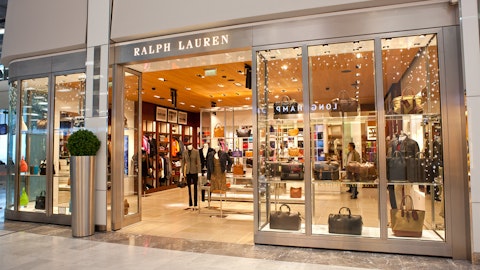We recently compiled a list of the U.K. Dividend Champions List: 2024 Rankings by Yield. In this article, we are going to take a look at where Unilever PLC (NYSE:UL) stands against the other U.K. dividend champions.
In recent years, investors have shown a preference for global stocks, particularly high-growth options like US technology companies, over UK equities. Over the past decade, the British index has achieved a 6% annual total return compared to 13% for the US broader market. Analysts suggest that this underperformance is partly due to weak earnings, domestic political instability, and the absence of a significant technology sector in the UK market. However, a notable factor is the sharp decline in valuations as investors have steered away from UK stocks. Goldman Sachs remarked that the challenge is not a lack of interest from foreign investors, who currently hold about two-thirds of the UK market capitalization, but rather the limited participation of domestic investors in UK equities.
That said, investing in UK stocks can still be a worthwhile choice. While the UK market lacks significant technology companies, its equities in sectors like finance, energy, and mining provide diversification opportunities that complement the tech-heavy and highly valued US markets. In addition, the UK’s index faces less risk from tariffs and trade restrictions. Goldman Sachs Research highlighted that UK equities could gain from various government measures, such as pension reforms aimed at boosting domestic investment in UK stocks and policies supporting homebuilding initiatives.
Lindsay Matcham, involved in futures sales trading at Goldman Sachs Global Banking & Markets, suggested that UK equities could appeal to investors seeking diversification. She noted that these stocks offer attractive valuations, strong dividend yields, and reduced concentration risk.
Russ Mould, investment director at AJ Bell, presented a rather interesting take on the UK market’s limited exposure to technology stocks. He pointed out that this reduced exposure has made the UK stock market less volatile compared to the US, where technology stocks are a key driver of market fluctuations. Mould observed that, despite its criticisms, the UK market experienced a relatively stable summer compared to the US, attributing this to differences in valuation and the relative expectations of the two markets.
The lower volatility in the UK market presents compelling investment opportunities, particularly given its attractive dividend yields. The FTSE 100 offers a yield of 3.68%, while the FTSE 250, representing medium-sized UK firms, provides slightly lower but still appealing income prospects. This setup allows investors to explore higher-growth sectors, such as smaller companies while benefiting from rising dividends. According to BlackRock, UK dividends are currently growing at a rate of 2-3%, aligning with long-term inflation. Stocks that consistently grow their dividends often have stable cash flows, enabling them to increase payouts over time.
Janus Henderson’s 2023 annual dividend report highlighted this upward trend, revealing that UK dividends reached approximately $86 billion in 2023, a significant rise from the $63.1 billion distributed in 2020. Given this, we will take a look at some of the best FTSE dividend stocks.
Our Methodology:
For this list, we reviewed the UK CCC Dividend list, which highlights UK companies with the longest histories of dividend growth. This list is based on the structure of David Fish’s US Dividend Champions spreadsheet and serves as a useful tool to help identify and screen dividend growth stocks in the UK. From this list, we chose 10 stocks with the highest dividend yields as of December 29 and arranged them in order from lowest to highest yield. We also measured hedge fund sentiment around each stock according to Insider Monkey’s database of 900 as of Q3 2024.
Why are we interested in the stocks that hedge funds pile into? The reason is simple: our research has shown that we can outperform the market by imitating the top stock picks of the best hedge funds. Our quarterly newsletter’s strategy selects 14 small-cap and large-cap stocks every quarter and has returned 275% since May 2014, beating its benchmark by 150 percentage points. (see more details here).

A supermarket shelf overflowing with a variety of fast-moving consumer goods.
Unilever PLC (NYSE:UL)
Dividend Yield as of December 29: 3.25%
Unilever PLC (NYSE:UL) is a British multinational consumer goods company that offers a wide range of related products. In the first half of 2024, the company experienced a 4.1% increase in sales on an underlying basis, driven by three consecutive quarters of positive volume growth. Pricing adjustments were in line with expectations, showing a gradual decrease. Improved gross margins provided the company with the ability to invest more in innovation, resulting in a significant boost to overall profitability. Its operating profit reached €6.1 billion, reflecting a 17.1% year-over-year growth.
Unilever PLC (NYSE:UL) has decided to abandon its plans to sell its €15 billion ice cream division to private equity firms and will instead focus on pursuing an independent public listing for the unit. Earlier this year, in March, the consumer goods company announced its intention to spin off its ice cream business and explore interest from private equity buyers for popular brands like Ben & Jerry’s, Magnum, and Wall’s. In the past 12 months, the stock has delivered a return of over 18.5%.
Hotchkis & Wiley Funds highlighted Unilever PLC (NYSE:UL)’s strong performance in its Q3 2024 investor letter. Here is what the firm has to say:
“Unilever PLC (NYSE:UL) is one of the world’s leading suppliers of consumer goods in the food, home care, and personal care categories, maintaining #1 or #2 market share over 75% of its business. With a new CEO and the involvement of an activist investor (Trian), Unilever is focused on execution and consistency, expecting low to mid-single digit volume-driven top line growth over the medium term, profit growth ahead of sales growth due to operating leverage and mix, and consistent return of cash to shareholders. Additionally, the company has announced plans to separate the Ice Cream business (13% of 2023 sales), which is expected to be completed by the end of 2025 and increase organic sales growth to 4-6% annually. Over the last quarter, the stock price reached a five-year high, as the company has continued to execute the plans laid out above. Unilever has not yet released their official third quarter results but has reiterated their confidence in achieving 3-5% organic sales growth for the full year, with the majority of this growth being driven by volume.”
Unilever PLC (NYSE:UL) also highlighted a strong performance in its cash segment, with free cash flow amounting to €2.2 billion during the period. By the end of the first half, the company had €4.97 billion in cash and cash equivalents, up from €4.1 billion at the close of December 2023. The company’s interim dividend comes in at £0.3696 per share for a dividend yield of 3.25%, as of December 29.
Of the 900 hedge funds tracked by Insider Monkey at the end of Q3 2024, 22 hedge funds held stakes in Unilever PLC (NYSE:UL), up from 21 in the previous quarter. These stakes have a total value of roughly $2 billion. With over 16.7 million shares, Fisher Asset Management was the company’s leading stakeholder in Q3.
Overall UL ranks 5th on our list of the U.K. dividend champions for 2024. While we acknowledge the potential of UL as an investment, our conviction lies in the belief that some AI stocks hold greater promise for delivering higher returns and doing so within a shorter time frame. If you are looking for an AI stock that is more promising than UL but that trades at less than 5 times its earnings, check out our report about the cheapest AI stock.
READ NEXT: 8 Best Wide Moat Stocks to Buy Now and 30 Most Important AI Stocks According to BlackRock.
Disclosure: None. This article is originally published at Insider Monkey.





